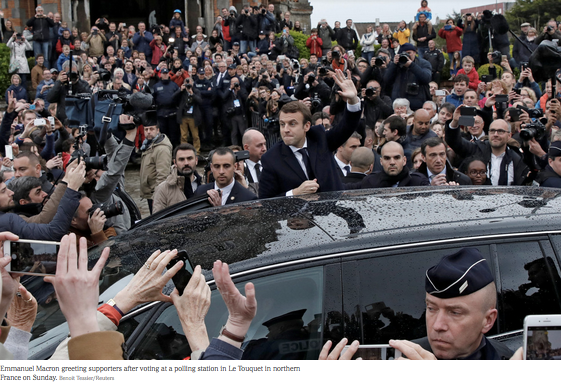PARIS — Emmanuel Macron, a youthful former investment banker, handily won France’s presidential election on Sunday, defeating the staunch nationalist Marine Le Pen after voters firmly rejected her far-right message and backed his call for centrist change, according to partial returns.
Mr. Macron, 39, who has never held elected office, will become the youngest president in the 59-year history of France’s Fifth Republic after leading an improbable campaign that swept aside France’s establishment political parties.
The election was watched around the world for magnifying many of the broader tensions rippling through Western democracies, including the United States: populist anger at the political mainstream, economic insecurity among middle-class voters and rising resentment toward immigrants.
Mr. Macron’s victory offered significant relief to the European Union, which Ms. Le Pen threatened to leave. His platform to loosen labor rules, make France more competitive globally and deepen ties with the European Union was also likely to reassure a global financial market jittery at the prospect of a Le Pen victory.
France Elects Emmanuel Macron
The victory was remarkable in many ways. When he enters the Élysée Palace to start his five-year term next weekend, Mr. Macron will be the youngest president in French republican history. He will be the first president in decades not to come from one of the traditional parties of the left or right; he formed his own centrist political party, En Marche! (loosely translated as “Forward!”) barely a year ago. A student of philosophy, accomplished pianist, former investment banker and most recently minister of economy under President François Hollande, he had never before run for office.
But dramatic and impressive as his victory is, Mr. Macron faces formidable challenges. He is taking charge of a nation deeply divided, much like the United States, Britain and other major democracies, with many people feeling marginalized by globalization, economic stagnation, an unresponsive government, unemployment, faceless terrorism and a tide of immigrants.
That a far-right nationalist like Ms. Le Pen could reach the second round of voting over the established parties, and then collect more than a third of the vote, was stark evidence of the despair of what she calls “les oubliés,” “the forgotten.”




